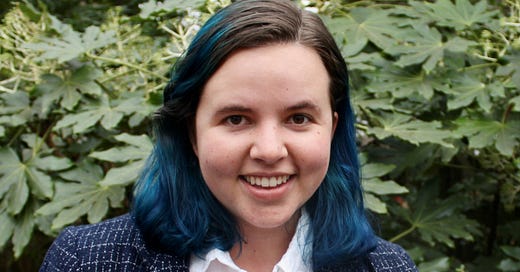Mississippi Transplant: Nora Katz
"One of my greatest points of pride in my life is that I have always been able to make a home everywhere I go. Home is where we plant ourselves, for now or for forever."
What does it mean to call Mississippi home? Why do people choose to leave or live in this weird, wonderful, and sometimes infuriating place? Today we hear from public historian, writer, and theatre-maker Nora Katz.
Where are you from?
I grew up in the woods of Pennsylvania, about 60 miles north of Philadelphia.
When did you move to Mississippi and why did you move here?
I moved here in September 2017 for my job, which I applied for despite never having been to the Deep South—“wouldn’t it be funny if I moved to Mississippi?” Reader, it was indeed funny.
I came straight from Dublin, Ireland, where I was living while earning a Master’s degree in Public History and Cultural Heritage at Trinity College Dublin. I did all of my job interviews in the kitchen of my tiny Dublin apartment—a preview of the COVID years.
What does “home” mean to you? How does Mississippi fit into that definition?
One of my greatest points of pride in my life is that I have always been able to make a home everywhere I go. Home is where we plant ourselves, for now or for forever.
I think I have lots of homes—my childhood home, the coast of Maine, and all the places where I’ve lived. Home is in a theatre, or on a weekly tabletop role-playing game Zoom call with friends, or with my cousins, or swimming in a lake in northeast Mississippi, or any time I’m near the Atlantic Ocean. Home is also the familiar aisles of the local grocery store, and around the kitchen table, and on the phone with my grandmother. Mississippi has been my home for the past five and a half years, and no matter what happens, it always will be.
What do you miss most about the place where you’re from?
I miss winter. The magic of snowfall, the quiet of the forest on cold early mornings, the crackle of the wood stove. Winter is my favorite season and I miss it more and more every year that I’m here. I miss being excited for snow rather than being afraid of losing water for weeks if it gets below freezing.
I know that a Mississippi summer has its own magic, but I am truly on the verge of tears every time I have to wear shorts in January.
Keep reading with a 7-day free trial
Subscribe to Rooted Magazine to keep reading this post and get 7 days of free access to the full post archives.





